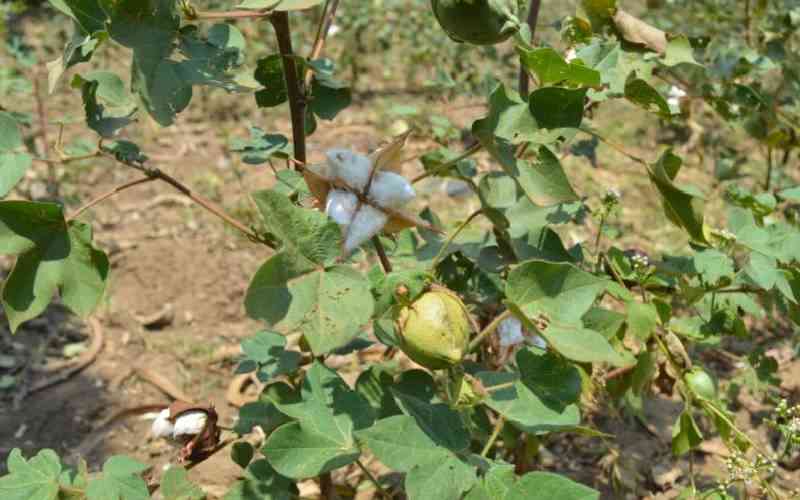 |
|
Area resident Vincent Mang’ata points to a spot where a herd of elephants is grazing in Mt Elgon Forest, Bungoma County. [PHOTO: DANIEL PSIRMOI/STANDARD] |
By DANIEL PSIRMOI
Bungoma County: In Chesamoo Village of Mt Elgon region, poaching cases are rare as the local community has developed quite a peculiar relationship with wildlife, particularly elephants.
In this region that traverses both Bungoma and Trans-Nzoia counties, locals have ‘domesticated’ elephants and other wild animals and take meticulous care of them, almost as if they were part of their livestock.
Vincent Mang’ata lives in the village that is located deep in Mt Elgon Forest. He, like most other residents, has been allowed to graze his animals in the forest by the Kenya Forest Service (KFS).
This writer, in the company of Bungoma county government officials and KFS security officers who were in the village on a fact finding mission over the weekend, accidently bumped into the father of five who sports a shaggy goatee.
He lets out a hearty laugh when he learns that our team, which has just endured a harrowing three-hour drive on bad roads, has not accomplished its mission more than two hours after arriving here.
“You have been looking for elephants for over two hours in this forest and have not spotted even one?” he asks. “Follow me; let me lead you to where ‘my large cattle’ are right now. It is not far from here,” offers Mang’ata.
Customs and taboos
And sure enough, a short trek later we bump into a herd of jumbos in a bushy area. Our guide creeps forward to within almost touching distance behind one of the largest land mammals, alarming one of the security officers on our team who tries to dissuade him. The animals run away as soon as they become aware of our intrusion.
“We have no cases of poaching here because these elephants are like part of our family. They are like our livestock and we keep an eye on them,” says Mang’ata later, when The Standard requests an interview after being impressed with his bushcraft.
He reveals that most of the clans of his Sabaot community have strict customs and taboos that have helped in the conservation of wildlife.
“Each Sabaot clan has a totem, mostly a wild animal. It is forbidden for anyone to kill an animal that is a clan totem. The different clans try as much as possible to prevent the killing of wild animals wherever they are. Subsequently the wildlife and ecosystem in Mt Elgon is saved,” says Mang’ata.
“As far as our elephants are concerned, we cannot kill them or allow poachers to kill them because we can do nothing with their meat. We do not eat elephant meat because we believe one might catch elephantiasis, or the disease can spread to our children.”
The residents have found an interesting use for elephant dung.
“The dung is highly prized here — if you use it as manure on whatever crop, you’ll reap a double harvest. Believe it or not, both Irish and sweet potatoes from this area are unusually large because elephant dung was used as manure,” he says.
Stay informed. Subscribe to our newsletter
First suspects
Robin Ngeywo, an assistant chief of Chemweisus sub-location, which extends to Mt Elgon Forest, attributes the close-knit relationship between the locals and the elephants to the mutual benefits that exist between the two.
Ngeywo says the locals have been allowed to graze their cattle deep in the forest reserve by wildlife officials and, therefore, have a moral responsibility to take care of the jumbos that freely roam the forest.
“Apart from the taboos, people like Mang’ata who graze their cattle in the forest must take care of the wild game.
“If anything happens to the wildlife they would be the first suspects and risk being barred from the grazing grounds,” says the chief, adding that this method of conservation should be replicated in different parts of the country to save endangered animal species.
Stiffer penalties
According to the Kenya Wildlife Service Senior Warden in charge of Mt Elgon area, Peter Muthusi, elephants are also a major attraction in the park in Trans-Nzoia County, but they roam freely on the Bungoma County side.
Sometimes they even stray very close to Kaptama and Kapsokwony towns where locals have a rare chance to view them.
Poaching of endangered wildlife has lately hit unprecedented levels drawing protests from animal rights activists.
The killing of elephants for their tusks in particular has caused a public outcry, with calls for stiffer penalties against poachers.
Local communities living around national parks, reserves and nature conservancies have been mentioned as the major accomplices in the illegal ivory trade, as most of them are said to work in cahoots with poachers.
 The Standard Group Plc is a
multi-media organization with investments in media platforms spanning newspaper
print operations, television, radio broadcasting, digital and online services. The
Standard Group is recognized as a leading multi-media house in Kenya with a key
influence in matters of national and international interest.
The Standard Group Plc is a
multi-media organization with investments in media platforms spanning newspaper
print operations, television, radio broadcasting, digital and online services. The
Standard Group is recognized as a leading multi-media house in Kenya with a key
influence in matters of national and international interest.
 The Standard Group Plc is a
multi-media organization with investments in media platforms spanning newspaper
print operations, television, radio broadcasting, digital and online services. The
Standard Group is recognized as a leading multi-media house in Kenya with a key
influence in matters of national and international interest.
The Standard Group Plc is a
multi-media organization with investments in media platforms spanning newspaper
print operations, television, radio broadcasting, digital and online services. The
Standard Group is recognized as a leading multi-media house in Kenya with a key
influence in matters of national and international interest.









